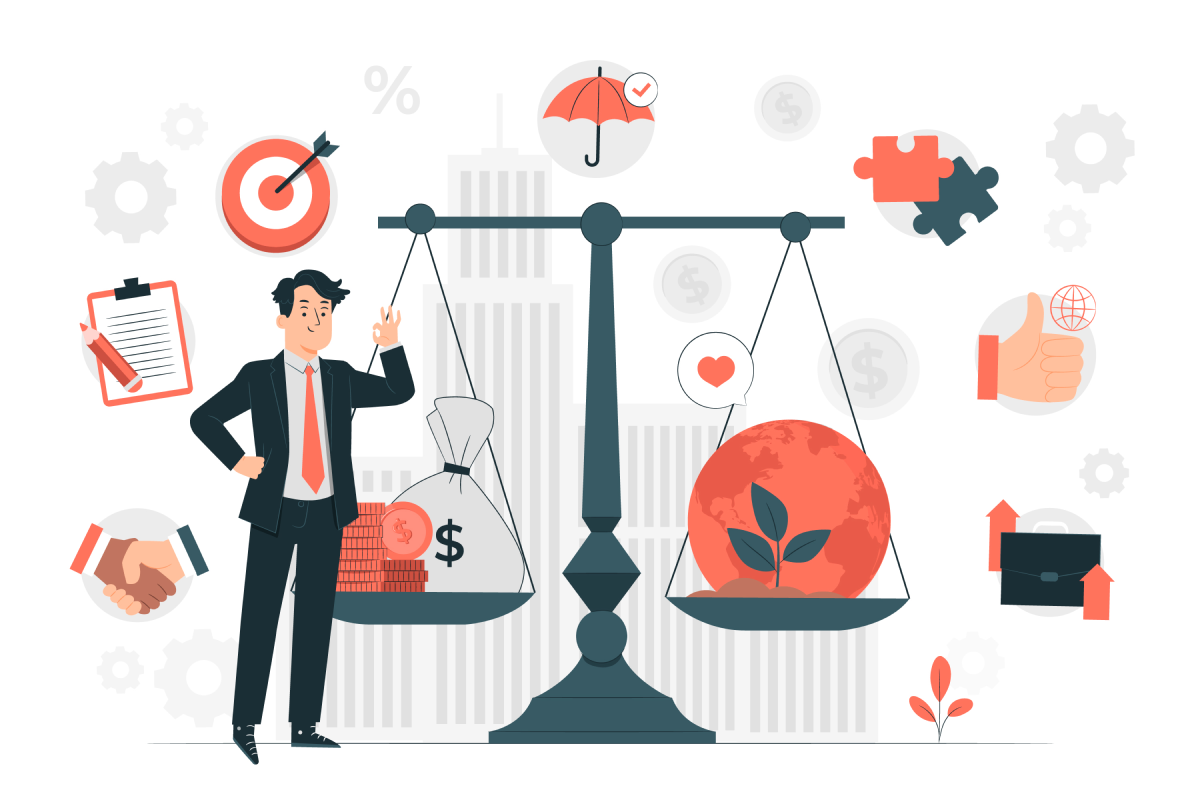Ethics and Privacy in Data Driven Organisation
Ethics and privacy are key for companies in the data-driven era. This post offers insights on embedding these principles into IT services, ensuring businesses stay ahead with trust and value at their core.

What is Data Ethics?
Data ethics is all about the right way to handle data. It means making sure that when companies collect and use data, especially private details, they do it in a way that is fair and respects people’s rights.
Divectors can help clients by providing comprehensive data audits to identify potential ethical risks and by developing customized data handling policies tailored to their specific needs. Our team offers training sessions to educate staff on the importance of ethical data practices and implements robust data governance frameworks to ensure ongoing compliance with evolving regulations and standards. Furthermore, Divectors supports clients in setting up secure data management systems, ensuring transparency in data collection and usage, and obtaining informed consent from users. This comprehensive approach ensures that clients can handle data ethically and responsibly, building trust and value in their business operations.
You can get deeper insights into this by getting our data consulting services.
Connecting Privacy with Data Ethics in IT Services
Data ethics and privacy go hand in hand. Privacy is about keeping individual information safe and giving people control over their own data. Data ethics takes a broader look, ensuring that all steps of data handling, from collecting to using it, are done responsibly.
For instance, an IT service provider should not only secure the data against breaches but also ensure it’s used in ways that are transparent and fair to the users.
Data Collection Ethics: The Make-or-Break Factor for Today’s Businesses
Knowing why data ethics is important helps us see how it can really help businesses do better. Let’s look at how making data ethics a priority can strengthen a company’s bond with its customers and stand out in the market.
Why Data Ethics Matters for Businesses
Now, businesses use a lot of data to make decisions and improve services. But with great data comes great responsibility. So, why is data ethics important?
Data ethics ensures businesses use data in a way that is good for both the company and the people whose data it is. For example, a company using data to improve customer service should also make sure they protect customer privacy.
Ethics of Data Collection to Maximize Your Edge
Embracing strong data ethics doesn’t just mitigate risks; it propels businesses forward. Companies that prioritize ethical data practices enjoy long-term sustainability, as they’re seen as trustworthy by their customers. This trust translates into customer loyalty, which is invaluable in today’s competitive market.
Moreover, a strong ethical stance on data can elevate a company’s reputation, attracting more customers and even top talent who want to work for a responsible and respected organization.
For example, a tech firm that implements and communicates clear data protection policies can foster a positive public image, setting itself apart as a leader in ethical tech practices.
If you want to reap those benefits for your own business, check out our data consulting services.

5 Key Data Ethics Principles Every Business Leader Must Know
Here are the five fundamental data ethics principles that professionals should integrate into their strategies:
- Ownership. Recognizing data rights and responsibilities.
- Transparency. Implementing clear and open data practices.
- Consent. Ensuring data sharing is informed and voluntary.
- Privacy. Protecting personal and sensitive information.
- Compliance. Observing legal and regulatory standards.
Below, we explain those simply, professionally, and with specific examples for clarity.
| Principle | Definition | Example |
|---|---|---|
| Ownership | Ownership in data ethics means recognizing that data about individuals has value and, therefore, rights and responsibilities are attached to it. | For example, a healthcare app collecting patient data must acknowledge the patient’s ownership of their data. This includes being clear about what data is collected and how it’s used. |
| Transparency | Transparency involves being open about how data is collected, used, and shared. A transparent company might provide easily understandable privacy policies that explain data practices in layman’s terms. | For instance, a social media platform could detail how user data influences the ads they see, providing users with clear insights into the data exchange process. |
| Consent | Consent is about ensuring that any data provided by individuals is given freely and with a full understanding of how it will be used. | A business practicing good consent will make sure their users or customers actively agree to data collection and use, perhaps through a clear opt-in process for email marketing campaigns, ensuring that users know what they’re signing up for and can easily opt out. |
| Privacy | Privacy protection is about taking steps to ensure personal and sensitive data is kept secure from unauthorized access. | An e-commerce site, for instance, should encrypt customer data to protect it during transactions and store it securely so that personal information like addresses and credit card numbers are not exposed to potential cyber threats. |
| Compliance | Compliance with legal and regulatory standards is non-negotiable. Businesses must stay updated with data protection laws relevant to their industry and region. | An example is a multinational corporation adhering to the GDPR in the EU, ensuring that data handling practices comply with the strictest privacy regulations. |
Steps for Integrating Data Ethics into Business Operations
At Divectors, we are proficient in handling the perplexity of data ethics and privacy. We know how to integrate ethics into an organization. Here is how we tackle it:
- First, we develop a comprehensive set of data standards that align with the objectives and guiding principles of Data Management best practices. This serves as our ethical framework for data management, guiding us in the collection, preservation, use, and proper distribution of information. If you’d like to learn more about data management, read our case about how a centralized data warehouse impacted data management at ConnectiveRx’s.
- To ensure these standards of data ethics and privacy are met, we establish explicit rules. These rules, grounded in our ethical principles, cover a broad spectrum of issues, including: data protection, data quality assurance, obtaining consent before using individuals’ data, safeguarding their rights.
- Education is a cornerstone of our strategy. Every team member is trained on the importance of data ethics and the specifics of responsible data handling in their daily roles.
- Next, we lay the foundation for robust data governance as we did for our client Virgin Active read about our Virgin Active data governance case). This involves setting standards, rules, and practices for the generation and consumption of data. A critical component is ensuring adherence to these guidelines. To manage this, we advocate for the establishment of a Data Governance Council. This council consists of professionals dedicated to ensuring compliance with our strict standards and ethical guidelines.
- Before initiating new projects or launching products, we pause to consider potential data challenges. By being proactive, we can circumvent any pitfalls and ensure our initiatives are both successful and ethically sound.

Tools and Technologies Supporting the Ethics of Data Collection
Below, we explore a variety of software solutions and platforms that support organizations in maintaining ethical data practices.
Data Privacy Management Software
Data privacy management software assists organizations in adhering to data protection regulations, managing data privacy risks, and securing sensitive information. Tools such as OneTrust and TrustArc enable businesses to comply with global data protection regulations and manage consent effectively. These tools offer automated data discovery capabilities, aiding organizations in identifying and classifying sensitive data across their IT infrastructure, encompassing both structured and unstructured data.
Data Governance Platforms
Data governance platforms provide software solutions aimed at overseeing and controlling an organization’s data assets throughout their lifecycle. These platforms often include features for managing data quality, metadata, data lineage, data stewardship, policy, and sometimes data quality enhancements.
Collibra
Offers a comprehensive data governance platform with capabilities for:
- data cataloging,
- data lineage,
- data quality management,
- metadata management,
- data privacy,
- compliance.
It enables centralized collaboration among data stakeholders and supports decision-making based on trusted data.
Informatica Axon Data Governance
Delivers a unified platform for data governance initiatives across an organization. It features:
- data cataloging,
- data lineage,
- data quality,
- metadata management,
- data privacy,
- business glossary management,
- policy enforcement capabilities.
Alation Data Catalog
Provides a data cataloging platform with integrated data governance capabilities. It supports:
- data discovery,
- data lineage,
- data stewardship,
- collaboration.
All this helps organisations use their data effectively while complying with regulations and policies.
Ataccama ONE Data Governance
This data management platform includes data governance features, offering:
- data cataloging,
- metadata management,
- data quality management,
- data lineage,
- policy management.
Compliance Automation
Automated compliance tools monitor and report on data usage to ensure adherence to ethical standards and regulations. Examples include:
- Compliance Management Systems. ZenGRC and LogicGate.
- Risk Assessment Tools. RiskWatch, Resolver, and Quantivate, which help organizations identify, evaluate, and prioritize operational, objective, or project risks.
- Regulatory Compliance Monitoring Tools. ComplyAdvantage, Actimize (by NICE), and AML Risk Manager, which assist in monitoring compliance with various regulatory requirements.
Data Anonymization Software
Data anonymization tools safeguard individual privacy while enabling data analytics and insights. They are crucial when sensitive data cannot be shared with third parties or uploaded to the cloud. Modern data platforms often require data anonymization and obfuscation to protect Personally Identifiable Information (PII) or Protected Health Information (PHI), sometimes even within different departments of the same organization.
Wrapping Up Ethical Issues in Data Collection
Integrating data ethics into corporate operations is about building trust. By implementing ethical practices and utilizing the right tools and technologies, businesses can ensure sustainable and responsible data use. The rapid advancement of technology offers numerous opportunities for seamless data integration. Divectors has exceptional experience in incorporating data ethics and governance into the modern organization’s data ecosystem. Reach out to us to fortify your data practices with integrity.
